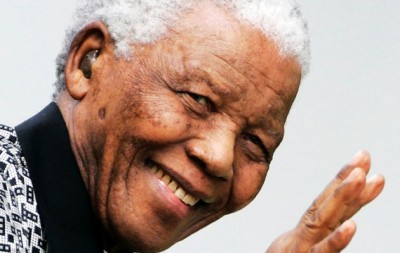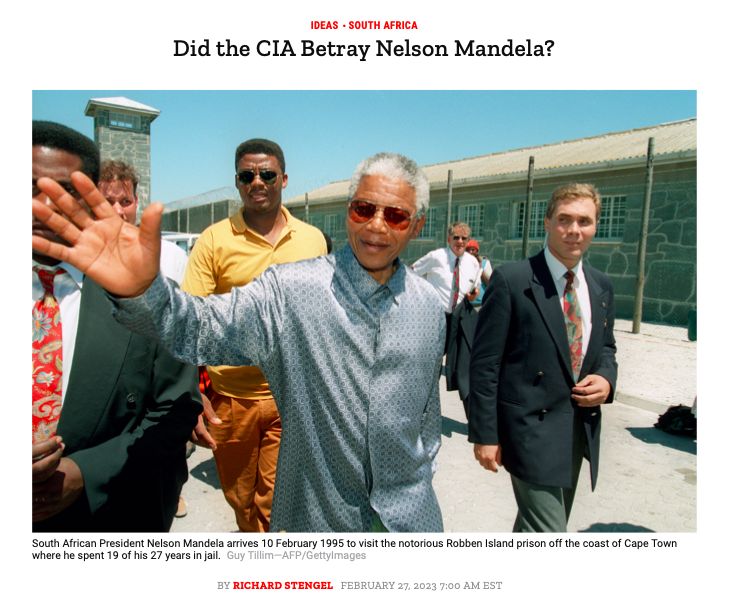The Betrayal, Arrest and 27-Year Imprisonment of Nelson Mandela: CIA Still Refuses to Declassify Documents Exposing Its Responsibility
CIA operative Donald Rickard admitted to role in capture of African hero

All Global Research articles can be read in 51 languages by activating the Translate Website button below the author’s name.
To receive Global Research’s Daily Newsletter (selected articles), click here.
Click the share button above to email/forward this article to your friends and colleagues. Follow us on Instagram and Twitter and subscribe to our Telegram Channel. Feel free to repost and share widely Global Research articles.
***
On August 5, 1962, Nelson Mandela was apprehended by South African authorities while driving with Cecil Williams, a white Communist theater director, from Durban to Johannesburg.
At the time, Mandela, a leader of the military wing of the anti-Apartheid African National Congress (ANC), was a fugitive from South Africa’s Apartheid regime.
After his arrest, Mandela was tried for treason and served 27 years at the infamous Robben Island prison, before being freed and becoming South Africa’s first Black president after the fall of the Apartheid regime in 1994.
Details have since emerged indicating that the South African police who arrested Mandela had been tipped off about his whereabouts by the CIA.
August 1962 was during the height of the Cold War—Mandela’s capture occurred only a few weeks before the Cuban Missile Crisis—and the American intelligence community believed that Mandela and the ANC were secret allies of the Soviets—which indeed they were.
The U.S. government was also intent on keeping South Africa open to U.S. corporations—the U.S. signed a military cooperation agreement with South Africa, an important source of uranium and other strategic minerals—and did not like the left-wing character of the ANC and the prospect of it destabilizing the country.
This past February, Richard Stengel wrote in Time magazine about his quest to uncover the truth about Mandela’s arrest.
Screenshot from Time
Stengel noted that, in 1986, while Mandela was still in prison, when the U.S. Congress was contemplating putting anti-Apartheid sanctions on South Africa, the Johannesburg Star printed an un-bylined news story that said, according to a “retired senior police officer,” the South African police had been tipped off to Mandela’s whereabouts by an American diplomat at the U.S. consulate in Durban who was “the CIA operative for that region.”
In 1963, the diplomat, according to the Star, had revealed his role while drunk at a party at the Durban apartment of “Mad” Mike Hoare, a well-known Anglo-Irish mercenary.
Four years after the Star article, at the time of Mandela’s release from prison in 1990 when he was about to visit the U.S. and get a hero’s welcome, the Atlanta Journal-Constitution published a piece reporting that a “retired [American] intelligence official” said that, within hours of Mandela’s arrest, a “senior CIA operative” named Paul Eckel walked into his office in Washington and said,
“We have turned Mandela over to the South African security branch. We gave them every detail, what he would be wearing, the time of day, just where he would be. They have picked him up. It is one of our greatest coups.”
The article further quoted a former South African intelligence official named Gerard Ludi as saying the CIA had a paid informant in the ANC Durban branch who told the local case officer where Mandela would be.
Then, in 2016, a long-retired CIA officer named Donald Rickard, then 88 years old, gave an interview to British film director John Irvin in which he said he had informed the South African police about Mandela.
Speaking to Irvin for his dramatized documentary, Mandela’s Gun, Rickard confirmed that he had been operating under cover as a State Department vice-consul in Durban.
He described the city as a “cauldron” of anti-Apartheid activity and that the ANC was riling up the city’s substantial Indian community.
Rickard stated further that
“Mandela was going to come down and incite the Indians and I found when he was coming down and how he was coming, and he came in a black limousine with a guy sitting in the back as the passenger and he was the driver. That’s where I was involved and that’s where Mandela was caught.”
When I was a professor at Bucknell University from 2006 to 2009, my office was next to Donald’s nephew, a popular English professor who had been active in the anti-Vietnam War movement who had told me about his Uncle and Mandela.
Reached for this article, he said he could not add anything more to what was reported by Stengel in Time magazine.
A 2018 biography of mercenary Mike Hoare quotes him confirming Donald Rickard’s story.
Rickard was personally unrepentant about assisting in Mandela’s capture, saying:
“Mandela was completely under the control of the Soviet Union. He was a toy of Moscow. He could have incited a war in South Africa. The United [States] would have to get involved, grudgingly, and things could have gone to hell…The Soviet Union would have done anything to get its hands on the mineral chest—anything—and Khrushchev said: ‘When we get it we’ll dictate the terms of surrender for the West.’ We were teetering on the brink here and it had to be stopped, which meant Mandela had to be stopped. And I put a stop to it.”
Donald Rickard died two weeks after his confession. His only regret was that he had been indiscrete. Rickard said “the biggest mistake of my life” was boasting about it at Mike Hoare’s party. “I was never promoted again after I came back from South Africa. They were embarrassed that I embarrassed them.”
Richard Stengel has recently reviewed declassified documents, which point to the U.S. government’s concern about Mandela being a Communist organizer, and the CIA’s role in tracking him.
Stengel filed a Freedom of Information Act (FOIA) request to see if they would confirm any details surrounding Mandela’s capture, which they refused to do.
Nevertheless, the evidence seems clear from Rickard’s testimony and other revelations that the CIA was behind the capture and long-term imprisonment of one of the 20th century’s greatest historical figures.
*
Note to readers: Please click the share button above. Follow us on Instagram and Twitter and subscribe to our Telegram Channel. Feel free to repost and share widely Global Research articles.
Jeremy Kuzmarov is Managing Editor of CovertAction Magazine. He is the author of four books on U.S. foreign policy, including Obama’s Unending Wars (Clarity Press, 2019) and The Russians Are Coming, Again, with John Marciano (Monthly Review Press, 2018). He can be reached at: [email protected].


